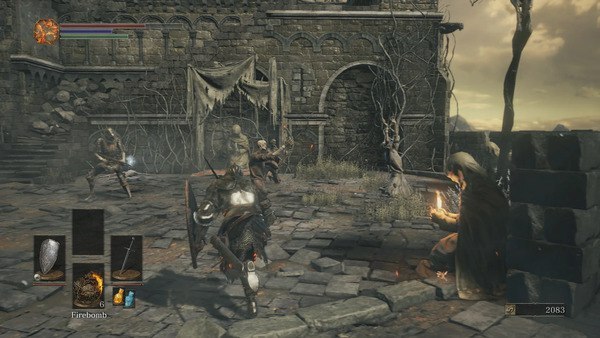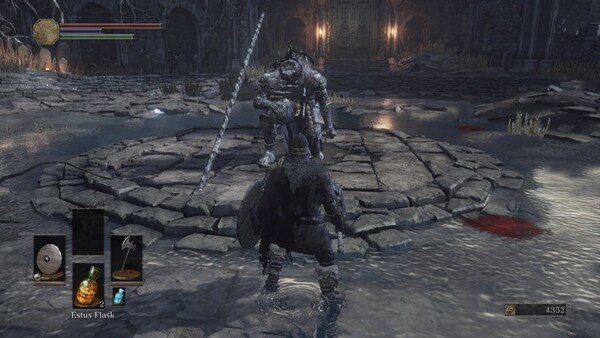Advertisement
Popular Now
Dark Souls III, the final installment in the critically acclaimed Dark Souls series, presents a world rich in lore, challenging gameplay, and intricate mechanics. For players looking to master this unforgiving realm, understanding the nuances of character creation, combat mechanics, exploration, and boss encounters is crucial. This guide will walk you through essential strategies and tips to thrive in Lothric, whether you're a newcomer or a returning veteran.
Introduction
With its steep learning curve and myriad of systems, Dark Souls III can be intimidating. However, by breaking down the game into manageable components and mastering each, players can cultivate a rewarding experience. This guide focuses on practical steps to enhance your gameplay, offering detailed insights into every facet of Dark Souls III, from creating the perfect character to defeating its most formidable bosses.



 Leveling up is crucial for increasing your character’s power. Each level allows you to allocate points to various attributes.
Leveling up is crucial for increasing your character’s power. Each level allows you to allocate points to various attributes.

Understanding Character Creation

Choosing Your Class Wisely
At the start of Dark Souls III, players must select a character class. This choice shapes your early gameplay experience and influences your overall build.Overview of Classes
- Knight: A well-rounded class with balanced stats and solid armor, perfect for beginners.
- Warrior: Focuses on strength, ideal for players who prefer heavy-hitting melee combat.
- Sorcerer: Magic-oriented, allowing players to engage enemies from a distance.
- Cleric: A hybrid class that combines melee fighting with healing abilities.
Tips for Class Selection
- Assess Your Playstyle: Choose a class that aligns with how you like to engage in combat. If you enjoy close-quarters fighting, opt for the Knight or Warrior. For those who prefer ranged attacks, the Sorcerer or Cleric is ideal.
- Consider Starting Equipment: Each class comes with specific gear that can ease your initial challenges. A Knight’s armor provides more protection, while a Sorcerer’s spells allow for early ranged combat advantages.
Customizing Your Character

Appearance and Starting Gift
After class selection, you’ll have the opportunity to customize your character’s appearance and select a starting gift. The starting gift can provide a crucial advantage in the early stages of the game.Recommended Starting Gifts
- Life Ring: Boosts your maximum health, essential for all builds.
- Fire Gem: Great for players planning to use fire-infused weapons.
- Young White Branch: Useful for stealth and can help you blend into the environment.
Crafting Your Character Build
Creating a strong character build involves strategic allocation of points into various attributes as you level up.Key Attributes to Focus On
- Vitality: Increases health; vital for surviving tough encounters.
- Endurance: Boosts stamina, allowing for more dodging and attacking.
- Strength/Dexterity: Depending on your weapon choice, allocate points to Strength for heavy weapons or Dexterity for lighter, faster weapons.
Mastering Combat Mechanics

Understanding Stamina Management
Stamina is the lifeblood of combat in Dark Souls III. It dictates your ability to attack, block, and dodge, making effective management essential.Tips for Stamina Management
- Avoid Overextending Attacks: Each attack consumes stamina; it’s crucial to leave enough for defensive maneuvers.
- Block Strategically: Relying too heavily on blocking can lead to stamina depletion. Learn to time your dodges instead.
- Keep an Eye on Your Stamina Bar: Always monitor your stamina during combat to avoid being left vulnerable.
Timing Your Attacks
Effective combat in Dark Souls III relies heavily on timing. Knowing when to strike, dodge, or block can determine the outcome of any engagement.Techniques for Better Timing
- Light vs. Heavy Attacks: Light attacks are quick and allow for rapid combos, while heavy attacks deal more damage. Knowing when to use each is critical.
- Mastering Backstabs and Parries: These techniques can greatly increase your damage output. Practice against weaker enemies to learn the timing.
Leveling Up Effectively
Understanding the Leveling System
 Leveling up is crucial for increasing your character’s power. Each level allows you to allocate points to various attributes.
Leveling up is crucial for increasing your character’s power. Each level allows you to allocate points to various attributes.
Key Attributes to Focus On
- Vitality: Increases health and is essential for survival.
- Attunement: Expands spell slots for magic users.
- Endurance: Enhances stamina and allows for heavier armor without penalties.
Prioritizing Your Levels
- Align with Your Build: Tailor your leveling strategy based on your chosen class and intended playstyle.
- Balance Your Attributes: While specializing is important, do not neglect Vitality and Endurance; they are key to surviving tough fights.
Utilizing Bonfires for Leveling
Bonfires serve as checkpoints where you can level up, heal, and replenish your items. Understanding their importance is vital for your progression.Tips for Bonfire Use
- Rest at Bonfires Often: Always rest to refill your health and Estus flasks before venturing out.
- Fast Travel: Unlocking fast travel between bonfires allows you to navigate Lothric more efficiently.
Exploring the World of Lothric

Learning the Map Layout
Understanding the layout of Lothric is essential for effective exploration. The world is interconnected, filled with hidden paths and secrets.Key Areas to Explore
- Firelink Shrine: Your central hub for upgrades, leveling, and NPC interactions.
- Lothric Castle: A pivotal location with multiple paths leading to bosses and unique items.
- The Untended Graves: A hidden area accessible later in the game, rich in lore and challenges.
Finding Items and Upgrades
Throughout your journey, there are countless items and upgrades to discover that can significantly enhance your gameplay.Tips for Item Collection
- Thorough Exploration: Always explore off the beaten path, as valuable items can be hidden in unexpected places.
- Interact with NPCs: Conversations with NPCs can unlock quests and provide valuable items.
Mastering Boss Fights
Preparing for Boss Battles
Boss encounters are a hallmark of Dark Souls III, often serving as the ultimate test of your skills. Proper preparation is key to success.Gear Up Properly
- Upgrade Your Weapons: Ensure your weapon is upgraded to maximize damage output. Use embers and materials to enhance effectiveness.
- Utilize Buffs: Items like Charcoal Pine Resin can temporarily increase your weapon’s damage, giving you an edge in tough fights.
Learning Boss Patterns
Every boss has unique attack patterns that can be learned and exploited for victory.Techniques for Learning Patterns
- Study Their Attacks: Spend the initial moments of the fight observing the boss’s moves and timing your actions accordingly.
- Practice Dodging: Timing your dodges perfectly can create openings for counterattacks.
Co-op and PvP Strategies
Engaging in Co-op Play
Dark Souls III offers cooperative play, allowing players to summon allies for challenging encounters. Understanding how to engage in co-op effectively can make difficult fights manageable.Summoning Allies
- Use the White Sign Soapstone: Place your summon sign in areas where other players are likely to seek assistance.
- Coordinate with Allies: Effective communication with your co-op partners can turn the tide in tough encounters.
Participating in PvP
PvP combat adds an extra layer of challenge to Dark Souls III. Here are strategies to enhance your PvP experience:- Know Your Build: Understand your character's strengths and weaknesses in PvP scenarios.
- Utilize Terrain: Use the environment to your advantage, creating obstacles between you and your opponent.
Crafting the Perfect Build
Understanding Build Types
Creating a successful build in Dark Souls III involves understanding character mechanics and playstyles.Common Build Types
- Strength Build: Focuses on high damage output with heavy weapons.
- Dexterity Build: Emphasizes agility and speed, utilizing lighter weapons.
- Magic Build: Centers on sorceries and miracles for ranged combat.
Customizing Your Build
- Weapon Selection: Choose weapons that complement your build and scale effectively with your attributes.
- Armor and Equipment: Pay attention to your equip load; balancing protection and mobility is essential.
Adapting to Challenges
As you progress, you may encounter challenges that require adjustments to your build. Here’s how to adapt effectively:- Experiment with Weapons: Try different weapons to find what suits your playstyle.
- Respec Options: Certain NPCs in the game allow you to reallocate your attributes, providing flexibility in your build.
Managing Resources
Understanding Estus Flasks
Estus Flasks are vital for healing during your journey. Managing these resources effectively is key to survival.Tips for Estus Management
- Allocate Wisely: Decide whether to prioritize healing or magic replenishment based on your build and playstyle.
- Use Healing Items: Keep healing items in your inventory for emergencies, especially in areas with tough enemies.
Collecting Souls
Souls act as currency in Dark Souls III, allowing you to level up and purchase items. Here’s how to maximize your soul collection:- Defeat Enemies: Regularly engage enemies to gather souls; each kill counts.
- Explore Thoroughly: Look for hidden areas containing valuable soul items.
Conclusion: Mastering Dark Souls III
Mastering Dark Souls III requires patience, strategic planning, and a deep understanding of its mechanics. Every aspect of the game interconnects, demanding adaptability and a willingness to learn from failures. By following this guide, players can navigate the trials of Lothric, enhancing their skills and strategies to emerge victorious in a world fraught with danger.Final Tips for Success
- Practice Makes Perfect: Embrace failure as a learning opportunity; each death is a chance to improve.
- Engage with the Community: Join forums and discussions to share insights and strategies with fellow players.
























